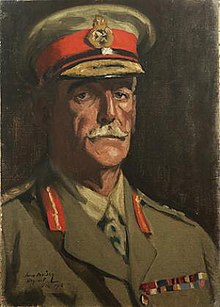Edward Bulfin
| Sir Edward Stanislaus Bulfin | |
|---|---|

Lieutenant General Sir Edward Bulfin
|
|
| Born | 6 November 1862 Rathfarnham |
| Died | 20 August 1939 (aged 76) Boscombe, Bournemouth |
| Allegiance |
|
| Service/branch | British Army |
| Years of service | 1884 – 1926 |
| Rank | General |
| Commands held |
Essex Regiment 2nd Infantry Brigade 28th Division 60th Division XXI Corps |
| Battles/wars | |
| Awards |
Knight Commander of the Order of the Bath Commander of the Royal Victorian Order Knight Commander of the Equestrian Order of the Holy Sepulchre |
General Sir Edward Stanislaus Bulfin KCB CVO (6 November 1862 – 20 August 1939) was a British general during World War I, where he established a reputation as an excellent commander at the brigade, divisional and corps levels. He was most noted for his actions during the First Battle of Ypres, when he organized impromptu forces to slow down the German assault.
In 1917–18 he commanded XXI Corps in the Sinai and Palestine Campaign.
Bulfin was born Woodford Park, Rathfarnham, Co Dublin the second son of Patrick Bulfin and Teresa Clare Carroll. His father was a son of Edward Bulfin from Derrinlough, King's County (now County Offaly), and was elected Lord Mayor of Dublin in 1870. He was educated at Stonyhurst College, and then at Kensington Catholic Public School Although he attended Trinity College, Dublin, he did not take a degree, choosing a military career instead.
From Dublin University he entered the Armagh Militia from where he was commissioned into the Princess of Wales's Own (Yorkshire Regiment) in 1884, following militia service with the Royal Irish Fusiliers. He was dispatched to India on 31 December 1889, and first saw active service in Burma in that year. He was promoted to captain on 30 January 1895. In 1898 he was appointed Garrison Adjutant at Dover, and in November embarked for South Africa with his fellow Irishman General Sir William Butler, as Assistant Military Secretary. When the Second Boer War broke out, in 1899 he was appointed Brigade Major to the 9th Brigade. He saw action at several skirmishes in South Africa, and was promoted to a brevet major in November 1900. He was present at several battles including Belmont and Graspan, Modder River, Magersfontein, Rhenoster and Lindley. He returned to the regular rank of Captain in his regiment on 12 December 1901, and served in South Africa until the end of the war, when he left Cape Town on board the SS Walmer Castle in late June 1902, arriving at Southampton the following month. On his return to England he received a brevet promotion to lieutenant-colonel in the South Africa honours list published on 26 June 1902, and abandoned regimental soldiering in favour of a staff career. From 1902 to 1904, he served as deputy assistant adjutant-general with I Corps, and from 1906 to 1910 as assistant adjutant and quartermaster-general for Cape Colony. After returning to England, he was promoted to colonel and given command of the Essex Brigade, an unusual appointment as Bulfin had never commanded a battalion. In 1913, he was promoted again, and appointed to the prestigious command of the 2nd Infantry Brigade.
...
Wikipedia
